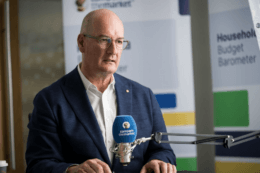
While the cost-of-living crisis continues to push the household budget to the brink, new research from Compare the Market has revealed that 72.1% of Australians surveyed could be paying more than they need to for gas and electricity by not switching in the last 12 months or more.
New statistics from Compare the Market found that 29.9% of Australians surveyed have never switched their gas or electricity retailer, meaning that they’re potentially paying too much for their current energy supply. Meanwhile, 42.2% of those surveyed say it’s been more than 12 months since they last switched.
Compare the Market’s Economic Director, David Koch, said the message isn’t sinking in that people could be paying more than they need to by not regularly comparing and switching retailers.
“It’s actually mindboggling that so many Australians could be needlessly throwing away their hard-earned money on gas or electricity plans that aren’t the cheapest available,” Mr Koch said. “In our household, my wife Libby constantly compares our energy plans to ensure that we’re on the best deal possible.
“No matter which gas or electricity retailer you’re with, the energy supply is exactly the same. The last thing we want to see is people sticking with a plan that’s too expensive because they’re either not aware that a better deal is available or because they think it’s too difficult to switch.
“The process takes less than an hour of your time, but could potentially save you big money. It’s a no-brainer to me that we need to get better at putting our bills under the microscope and sniffing out better deals.
“We’re used to ringing our bank for a better deal… now we have to do it with our energy provider.”
Compare the Market’s data shows that Baby Boomers are the most likely to have never switched retailers, with 31.6% of the cohort sticking with the same retailer. Conversely, one in 10 Millennials have switched retailers in the last three months – the most of any generation.
According to Compare the Market’s Budget Barometer, rising energy prices are one of Australia’s biggest financial fears over the next 12 months. While wholesale prices might be falling and people may be thinking that retail prices will soon follow suit, Mr Koch said it’s up to households to ensure they’re not paying a cent more than they need to.
‘When it comes to your energy plans, people aren’t aware that you typically roll onto a more expensive plan after the benefit period expires, which is usually 12 months,” Mr Koch said. “This means that any discounts or incentives you previously enjoyed don’t always carry over to your new plan and you could be missing out on cheaper energy prices by sticking with the same plan or retailer.
“Thankfully, retailers in Victoria, New South Wales, Queensland, South Australia, Tasmania and the Australian Capital Territory are now required to let their customers know if they can offer them a cheaper energy plan at least once every 100 days on their bill.
“However, while retailers must display a ‘better offer’ message on your bill and inform you if they have a cheaper offer available, it’s not actually reflective of the whole market. So, it’s never been more important to get into the habit of comparing your plan against others on the market.”
In some good news, Compare the Market’s data shows that around 1 in 10 Aussies (10.7%) have switched plans in the last six months, while 6.9% say they’ve moved to a new provider in the last three months.
“Australians that regularly compare their current energy plan against others on the market have the right idea,” Mr Koch said.
“While it doesn’t cost anything to compare energy retailers and plans, your current retailer may require an exit fee if it’s included in the terms and conditions of your contract. If you’re subject to such penalties, you’ll need to weigh up the benefits of the savings compared to the costs of prematurely ending your contract term.”
Mr Koch’s top tips for looking for a better energy deal
- Always read the fine print, as plans available, even those with the same retailer, can be priced differently. Keep an eye out for any discounts available or any conditions you need to meet to maximise your benefits.
- Consider the supply charge as this could be very high compared to other retailers offering similar usage rates, with lower supply charges.
- Understand what electricity tariff(s) your home has, as they’re not all the same. For example, a time-of-use tariff means you’ll be charged different rates depending on the time of day or night.
- Retailers can set their own solar feed-in tariffs, which is the amount you’re credited for the solar electricity you export back to the grid. Check the difference between the solar credit you may receive and your usage from the grid.
- If it’s been more than a year since you’ve switched retailers or plans, you’ve likely defaulted to an offer with a higher price. Even though prices are increasing across the board, deals are still available, and you could pay less overall.
*Survey of 1,002 Australian adults, conducted November 2023.
For more information, please contact:
Phillip Portman | 0437 384 471 | [email protected]
Compare the Market is a comparison service that takes the hard work out of shopping around. We make it Simples for Australians to quickly and easily compare and buy insurance, energy, and home loans products from a range of providers. Our easy-to-use comparison tool helps you look for a range of products that may suit your needs and benefit your back pocket.








